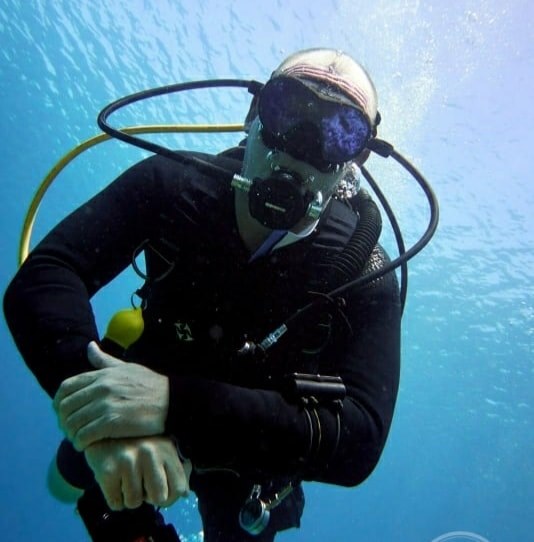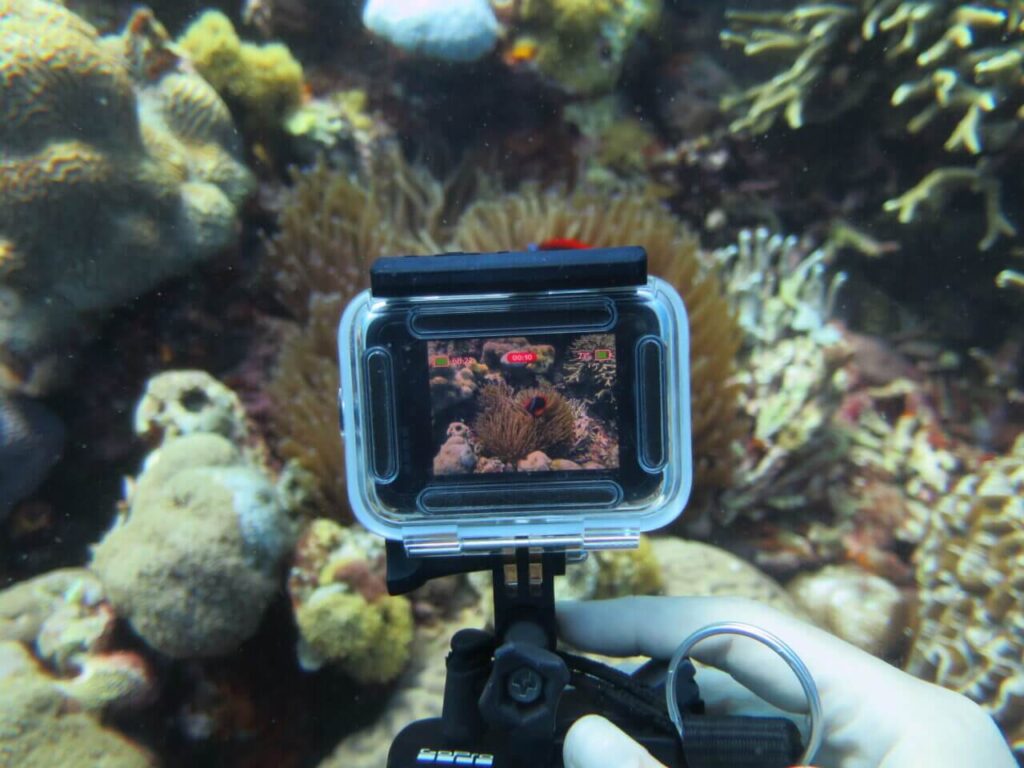Luke Spence is a PADI Staff Instructor and resides in Puerto Galera, the Philippines.
He taught me the first half of my Divemaster course when I spent 5 months in Puerto Galera, during 2020’s Covid-19 Pandemic.
Outside of scuba diving, Luke loves beer, video games and sunset. He also goes by the name of Billy Big Balls.
Let’s take a look at what Luke has to say in response to some of the biggest Diving Squad questions of all time:

1) Why do you scuba dive?
I think I probably share the same view on this as a lot of people that scuba dive – which is that basically, scuba diving is therapy. You’re kind of in zero gravity and there’s almost complete silence when you’re underwater- it gets you away from the craziness that is the modern world so that’s why I do it.
2) What is one of the coolest things you’ve ever seen on a dive?
It’s hard to say man, I’ve seen a lot of cool stuff – but I’d say one thing you never get tired of seeing is sharks and one type of shark that I love in particular is thresher sharks – their pretty friendly so you can get nice and close to them! You get thresher sharks in Puerto Galera for around 4 months of the year when the water’s a bit colder; between November and February.
3) What’s one of your favourite scuba diving locations of all time and why?
Having lived in the Philippines for 7 years and dived all over the place, I’ve seen some really cool stuff but I think the best place I’ve been diving so far in terms of its versatility is Puerto Galera, because you get the super macro and the amazing coral reef.
In terms of diving that’s not available by day, that you have to get to via liveaboard, I’d have to say Apo Reef – you get a lot of bigger stuff there like bumpheaded parrotfish and sharks on almost every dive. But still in terms of versatility and diversity: Puerto Galera, coupled with a day trip to Verde Island.
I’d say an amazing diving holiday would be 4 or 5 days in Puerto Galera as well as a day trip to Verde island and from there you could easily go to Coron which is part of Palawan – that would be one of the best diving holidays you could do in the world.
4) What advice would you give to someone who wanted to improve their scuba diving?
There are lots of people who would say otherwise, but for me, I’d say do a lot more diving: dive, dive, dive – get experience under your (weight!) belt.
5) What with global warming and overfishing, have you noticed marine communities change over the last 10 years?
I’ve been in the dive industry for only about 10 years which is a comparatively very small amount of time. There’s a lot of people who’ve been in the industry a lot longer who would tell you that fish stocks have dwindled, there’s a huge issue with overfishing and at this point there’s no longer any such thing as sustainable fishing anywhere in the world.
Have I really noticed in the last 10 years that there’s a real issue? I don’t think I really have. I’ve been in Puerto Galera for 3 years and in that time I have not noticed a change, in fact I have friends who’ve been here over a decade who say the diving is getting better year on year – the reef is getting healthier, which may be because it has better protection now.
Before tourism, Puerto Galera was a fishing village but now people are realising the economic potential of the marine life; it’s being protected much better. Scuba diving is definitely helping communities realise that for example a kilo of shark is worth about 200 pesos but over it’s life time that shark can be worth thousands of pesos as a tourist attraction.
6) What advice would you give people to help preserve the marien enviornment for future generations to come?
Having lived in the Philippines for a long time, you do notice how poor government facilities result in issues like undeveloped trash collection. I’ve lived on islands where the only way to get rid of trash was to burn it, bury it or throw it in the sea.
But as soon as people realise this could affect their future income, they do start to change their behaviour and I’ve worked with a lot of organisations that have put a lot of effort into educating the community and in those places I’ve seen peoples attitudes change where they actually want to do something about the problem.
So it’s about educating communities and giving them an incentive to protect their local ocean habitat and a great way to do that is through wildlife tourism such as scuba diving.
7) If you could be any marine animal for a day what would you be and why?
I think there is a lot of potential for some types out there to be like “I wanna be a bull shark cos it’s the most aggressive animal in the sea” or “I wanna be a clownfish” cos it’s so colourful and fun and friendly” – but me personally: I think it would be cool to be a giant clam for the day because you’re just gonna sit there, chilling, breathing in a bit of water, eating a little bit of what’s floating in there, maybe blowing out a little bit of smoke. You’ll be so big that you can’t be hassled by predators so life is going to be fairly easy and relaxing.
8) Is there anything else you’d like to say?
Well done for becoming a dive professional mate, I wish you all the best with Diving Squad and hope to see you back in Puerto Galera soon when all this pandemic madness is over.

